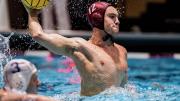In track, sprinters kick off their starting blocks with all their might, springing forward like an arrow from a bow. In basketball, an emphatic dunk is invariably preceded by an emphatic push off the floor. But athletes don’t have the advantage of a solid surface in water polo. Momentum is at a premium; wasted movement is punished.
Alex Tsotadze ’22 [’23], an attacker and co-captain of the men’s water polo team, is an expert at exploiting aquatic physics. In driving to the goal, he’ll first cut away, hoping to deceive his defenders. “When I feel them jump,” he explains, “that’s when I cut behind them.” Receiving an obstructed pass, it’s just the opposite: a feint toward the goal and a slash away. “You don’t want to run through the motions—because you can read that when you’re on defense,” he says. “If you can make it look like you’re a threat at all times, you can start to shift the defender’s body weight and momentum.” Every offensive move is quick and aggressive—a “scoring move.” When there’s a hint of an opening in goal, Tsotadze takes it, judging whether the situation calls for a sidearm skip, a lob, or a straightforward power shot. “He’s exceptionally good at reading the goalie,” says head coach Ted Minnis, “and he can rip.”
Rip he has. As a junior captain, Tsotadze tallied 71 goals for the Crimson, the seventh-highest mark in the program’s history. His 168 goals during three varsity seasons already put him eighth on the all-time scoring list, with a chance of reaching number two by the end of this fall 2022 season. But what earned Tsotadze a captainship and two all-conference first-team distinctions is his range. While leading the Crimson in scoring, he also finished second in assists (39) and steals (32) and third in blocks (8). “If I’m having a bad shooting day, how can I make the right pass or make the next stop or draw an exclusion [penalty] and put ourselves in the right position?” he says. “It’s just being able to read how things are going in the game, what advantages we have, and then playing to those advantages.”
Born in Tbilisi, Georgia, Tsotadze was never far from the water. When he was just weeks old, his father, a former professional water polo athlete on the Georgian national team, brought him into the ocean for the first time. He began swimming lessons at three and soon was swimming competitively. Though it gave him a strong foundation of speed and efficiency, he was relieved when his dad finally brought him to a water polo practice when he was eight. “I’m a team sports kind of guy,” he says. And the sport was captivating: “It’s incredibly intense and physically challenging. It was really cool to feel confident and competent in the water—in a space that’s very foreign to most people.”
After moving to Menlo Park, California, in the eighth grade, Tsotadze enrolled at Sacred Heart Preparatory School. He quickly took on a starting role on the water polo team, which consistently ranks in the country’s top 10. The sport stretched all year round, including daily practices that lasted six or seven hours in the summer. When he wasn’t playing at Sacred Heart, he was competing for the Stanford Water Polo Club—also among the nation’s best. He played for the Georgian U18 national team in 2015 and the U.S. men’s youth water polo squad in 2018, helping earn a silver medal at the Pan American Games. For the star attacker, strength on the defensive side was just as important. Competing for his school and club teams, he aimed to shut down the opposing team’s strongest player, tracking him across the pool.
It would be natural for a California talent like Tsotadze to remain in the country’s water polo epicenter. At the high school level, only two of the nation’s top 50 teams are based outside the state. Stanford, UCLA, USC, and the University of California, Berkeley (Cal)—the “Big Four”—are perennially ranked as the top collegiate programs in the country. Early in high school, Tsotadze heard from club coaches that East Coast water polo was a “joke.” But that reputation has gradually shifted. In 2016, Harvard made the NCAA Water Polo Championship semifinals for the first time. The strength of the team, the University’s resources, and the close-knit culture fostered by Coach Minnis drew him in.
Adjusting wasn’t easy. Tsotadze found undergraduates were not only bigger, faster, and stronger than high-school competitors, but also smarter. “When you’re young, you can kind of push people and get open and have enough space,” he explains. “But now, if I push this grown man who’s massive, he’s just probably not going to move.” Moving them meant tricking them into moving themselves, then using their momentum against them. He also had to adjust to an academic course load in economics and a new training schedule; the Ivy League limits practice time to a maximum of 12 hours weekly in season and six out of season.
But the team performed well. In September 2018, during his freshman season, the Crimson defeated Cal—the first time a Big Four school had lost to a school outside of California—and finished the season with a 22-8 record. In 2019, they went a perfect 27-0 during the regular season and beat Princeton in the Northeast Water Polo Conference (NWPC) championship. In those seasons, Tsotadze could often be found working on his shot one-on-one with close friend, goalie, and current co-captain Noah Hodge ’22 [’23]. If Hodge blocked a shot, Tsotadze would ask how he did it. Was there a sudden change in arm angle? An obvious look to the corner? “At one point, when I was faking, I’d do this little half-hitch right before I was about to tuck it back to shoot,” he says. “He could pick up on it.…I honestly couldn’t tell the difference because that’s how I’ve been shooting my whole life.” Sure enough, when Tsotadze watched a recording of his shooting motion, he noticed, too. “And then I adjusted it,” he says. “I think it made a big difference.”
After a season off during the pandemic, Tsotadze returned as a captain in 2021 for a season of highs and lows. In an early game against Princeton, he felt the team was playing better than ever. But the season ended with a NWPC semifinals loss to Brooklyn’s St. Francis College—an opponent the Crimson had crushed 20-5 just weeks earlier.
The loss lit a fire under the team heading into the following 2022 season, Tsotadze says. During 2021, circumstances had been strange; with no Ivy League season given the pandemic hiatus, most teammates were playing together for the first time when the season began. Now, Minnis believes that the 2022 group is the most talented squad in Crimson history and commends Tsotadze for creating strong team bonds in a limited time. He recalls, with fondness, Tsotadze and his mother making homemade pizza for the California-based members of the men’s and women’s teams from his home in Menlo Park. “His thought wasn’t, ‘Oh, I’m just going to invite my guys,’” Minnis says, “It was, ‘I’m going to invite our family.’”
Tsotadze hopes the team can close out his last senior fall with a NWPC championship at least—and maybe a deep NCAA tournament run. “We’re looking forward to stepping up this year,” he says, “and really proving that last year’s finish was a fluke.”









